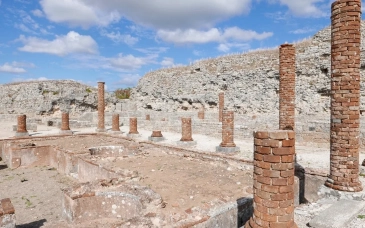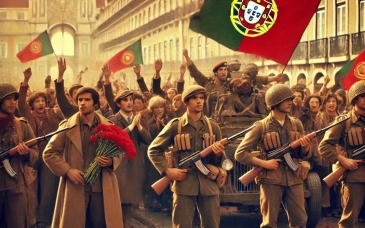The Estado Novo ("New State") was an authoritarian regime that governed Portugal from 1933 until 1974, under the leadership of António de Oliveira Salazar. While politically secular, the Estado Novo was closely aligned with the Catholic Church, which became a cornerstone of Salazar's vision of a disciplined, moral, and hierarchical society. Unlike other European authoritarian regimes that sought to suppress religion, the Estado Novo embraced Catholicism as a vital part of its identity, promoting traditional values and integrating the Church into the social and moral fabric of Portuguese life. The partnership between the Estado Novo and the Catholic Church brought benefits to both, yet also generated tensions, especially as the regime faced increasing criticism for its colonial policies and authoritarian control. This article explores the Catholic Church’s relationship with the Estado Novo, its influence on Portuguese society, and the eventual tensions that led to a more complex and nuanced role by the end of Salazar’s rule.
Background: Portugal and the Catholic Church Before the Estado Novo
The First Republic and Anti-Clericalism
The Estado Novo regime’s partnership with the Catholic Church was partly a reaction to the preceding First Portuguese Republic (1910–1926), a period marked by staunch anti-clericalism. After the Portuguese monarchy was overthrown in 1910, the First Republic introduced sweeping secular reforms aimed at reducing the Church's influence over Portuguese society. This included the separation of church and state, the nationalization of Church properties, and restrictions on religious practices and the clergy.
The republic’s secular policies alienated many Catholics, particularly in rural areas where the Church played an essential role in community life. This period of anti-clericalism, combined with the First Republic's political instability, created a vacuum that the Estado Novo would later fill, offering a vision of unity, stability, and moral order anchored in Catholic values.
Salazar's Rise to Power and Catholic Influence
António de Oliveira Salazar, a Catholic and former professor of economics, rose to power during a period of political upheaval following a military coup in 1926. Appointed as Minister of Finance, Salazar quickly gained influence due to his skill in managing the nation’s finances, and by 1932, he was appointed Prime Minister. Salazar established the Estado Novo regime in 1933, instituting a corporatist constitution inspired by conservative and Catholic social teachings, including those expressed in the 1891 papal encyclical Rerum Novarum, which addressed the social challenges of industrialization and emphasized the Church's role in social affairs.
Salazar’s Estado Novo regime was guided by three principles: God, Fatherland, and Family. Each of these principles echoed Catholic doctrine, emphasizing a moral order, loyalty to the nation, and the importance of traditional family structures. By aligning his regime with Catholic teachings, Salazar gained legitimacy among Portuguese Catholics, positioning the Estado Novo as a protector of the Church and its values.
The Estado Novo and the Catholic Church: A Symbiotic Relationship
The Concordat of 1940
One of the most significant milestones in the Church’s relationship with the Estado Novo was the signing of the Concordat in 1940. This agreement between the Vatican and the Portuguese government formalized the Church's role in Portugal, granting it certain privileges and protections. The Concordat recognized Catholicism as the religion of the majority, allowed religious instruction in public schools, and provided the Church with tax exemptions and legal protections. In exchange, the Church agreed to refrain from political activities that could destabilize the Estado Novo.
The 1940 Concordat also represented a mutual acknowledgment of shared interests. For Salazar, the Church provided moral authority and social stability, supporting his vision of an orderly and hierarchical society. For the Church, the Concordat restored many of the rights and privileges it had lost under the First Republic, including the ability to openly practice and promote Catholicism without interference from the state.
The Moral Agenda: Promoting Traditional Values
The Estado Novo embraced a moral and cultural agenda aligned with Catholic teachings. This included policies that reinforced traditional gender roles, discouraged divorce, and opposed birth control. The regime promoted the ideal of the Portuguese family as a patriarchal institution, with the father as head of the household and the mother as the guardian of moral values. The Church supported these policies, as they aligned with its teachings on marriage and family.
Education was another critical area where the Estado Novo and the Church cooperated. The state supported Catholic schools and allowed religious instruction in public schools, viewing education as a means to instill discipline, obedience, and moral virtue. Textbooks often included religious themes, and students were encouraged to respect the authority of the Church. This partnership helped maintain the Church’s influence over Portuguese youth and provided a counterbalance to the secular, anti-clerical education policies of the First Republic.
The Catholic Church as a Social Institution
Beyond education, the Estado Novo and the Catholic Church worked together to provide social services, particularly in healthcare and poverty relief. The Church was deeply involved in charitable work, establishing orphanages, hospitals, and soup kitchens. Catholic religious orders, such as the Sisters of Charity, managed numerous institutions that provided services to the poor and vulnerable.
Through its social work, the Church gained influence over the lives of ordinary Portuguese citizens, especially in rural areas where state institutions were often limited. This arrangement also benefited the Estado Novo, as it allowed the regime to rely on the Church’s social network rather than developing state-run welfare programs. By providing these services, the Church helped maintain social order, reinforcing the Estado Novo’s paternalistic approach to governance.
Church-State Tensions and Challenges
Criticism of Estado Novo’s Colonial Policies
While the Church and the Estado Novo shared many ideological values, tensions emerged, particularly around Portugal’s colonial policies. The Estado Novo maintained a vast colonial empire, including territories in Africa and Asia, which Salazar was determined to preserve despite growing international condemnation. The Catholic Church, especially the younger clergy influenced by progressive social teachings, became increasingly concerned about the ethical implications of colonialism, as the Church had a significant presence in Portuguese Africa and other colonies.
The Vatican, under Pope Pius XII and later Pope John XXIII, began to adopt a more critical stance on colonialism, influenced by post-war decolonization movements. By the 1960s, as anti-colonial movements gained momentum and conflict escalated in Angola, Mozambique, and Guinea-Bissau, the Church found itself in a delicate position. Some Catholic clergy and missionaries openly criticized the Estado Novo’s oppressive policies, advocating for the rights of indigenous populations and calling for a more just and humane approach to colonial governance. This criticism, although not widespread among the clergy, created tensions between the Church and the regime.
The Influence of Vatican II and Liberation Theology
The Second Vatican Council (1962-1965) introduced significant reforms to the Catholic Church, emphasizing social justice, human rights, and dialogue with the modern world. Vatican II encouraged the Church to address issues of poverty, inequality, and political oppression, which resonated with many young Portuguese priests and laity. In the context of the Estado Novo, Vatican II’s emphasis on social justice and human dignity indirectly challenged the regime’s authoritarianism and its treatment of colonial subjects.
Furthermore, the rise of Liberation Theology in Latin America inspired many Portuguese clergy to adopt a more active stance on social justice issues. Liberation Theology advocated for the poor and oppressed, viewing the Church as a force for social change. Although it had less direct influence in Portugal than in Latin America, its themes of human rights and opposition to authoritarianism began to influence segments of the Portuguese clergy, particularly those working in impoverished communities or in the colonies. Some priests began to distance themselves from the Estado Novo’s policies, aligning with broader Catholic calls for social justice and human rights.
Growing Dissent and the Catholic Youth
By the late 1960s, dissent within the Catholic community in Portugal was becoming more evident. Catholic youth organizations, inspired by Vatican II, began advocating for greater social and political freedom. These groups became increasingly vocal about issues such as workers’ rights, poverty, and Portugal’s ongoing colonial wars. This new generation of Catholics, influenced by international movements for civil rights and social justice, began to question the Estado Novo’s authoritarian approach and the Church’s complicity in supporting it.
The Catholic Church’s official leadership remained cautious in its criticism, but individual priests and lay Catholics became more outspoken, challenging the Estado Novo’s policies. This shift in Catholic sentiment reflected a broader societal change, as opposition to the regime grew among intellectuals, students, and labor activists.
The Final Years of the Estado Novo and the Carnation Revolution
The Church’s Shifting Position
As the Estado Novo faced increasing opposition, including from within the Catholic community, the Church began to adopt a more critical stance. The death of Salazar in 1970 and his succession by Marcelo Caetano marked a period of reform attempts, but the underlying authoritarianism of the regime remained intact. By the early 1970s, as Portugal’s colonial wars continued and international pressure for decolonization mounted, segments of the Church became more vocal in their calls for change.
Several bishops, notably Bishop António Ferreira Gomes of Porto, began to criticize the regime’s policies, particularly its colonial wars and censorship. Bishop Gomes had a history of criticizing the Estado Novo; he had previously been exiled by Salazar in 1959 due to his outspoken opposition. His criticisms resonated with Catholics who were increasingly dissatisfied with the regime’s authoritarian nature and the toll of the colonial wars.
The Carnation Revolution and the End of the Estado Novo
On April 25, 1974, a bloodless military coup, known as the Carnation Revolution, overthrew the Estado Novo, marking the end of Portugal’s authoritarian era. The revolution was largely led by the Armed Forces Movement (MFA), a group of young military officers disillusioned by the prolonged colonial wars and the regime’s failure to address social issues. The Catholic Church, although not a direct participant, was generally supportive of the revolution’s goals of democracy and social justice.
Following the revolution, the Church continued to play a role in Portuguese society, advocating for human rights, social justice, and democratic reforms. Many clergy who had criticized the Estado Novo found themselves aligned with the new democratic government’s objectives, as the country transitioned to a more open and pluralistic society.
The Legacy of the Catholic Church in the Estado Novo Era
The Catholic Church’s relationship with the Estado Novo was complex, characterized by a blend of support, complicity, and eventual dissent. Initially, the Church found in Salazar’s regime a protector of its interests, a guardian of traditional values, and a counterweight to the secularism of the First Republic. Through the Concordat of 1940 and the promotion of Catholic social values, the Estado Novo and the Church enjoyed a mutually beneficial partnership that shaped Portuguese society for decades.
However, as global attitudes toward colonialism and authoritarianism shifted, segments of the Church began to question the Estado Novo’s policies, especially regarding its colonial wars and lack of political freedom. Influenced by Vatican II, a new generation of Catholics embraced social justice and human rights, setting the stage for the Church’s eventual distancing from the regime.
The legacy of the Catholic Church’s role in the Estado Novo is a testament to the complex interplay between religion and politics in Portugal. While the Church initially bolstered the Estado Novo’s authority, it ultimately adapted to the changing moral and political landscape, advocating for values of justice and human dignity that would shape Portugal’s transition to democracy. Today, the Catholic Church in Portugal reflects both its historical roots and its commitment to social justice, a legacy shaped by its experiences during the Estado Novo era.

